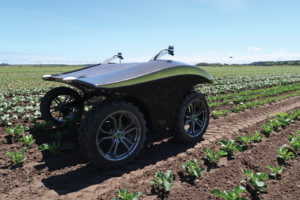
Greentech Robotics, based in Palmerston North and founded by Don Sandbrook, specialises in automated seeding, harvesting and high-density salad mix and baby carrots.
Now with increasing pressure on growers in terms of labour costs and the outlawing of herbicides in many countries, the Greentech Robotics team are developing a robot that could replicate the accuracy of a human-being with a hoe and potentially removing the need for herbicides altogether.
But this doesn’t come without its challenges says Greentech Robotics director Rob Baan.
“The difference between us and most of the other groups working in this space around the world is that we are looking at an extraction option. That is technically a lot harder because we have to get a lot closer to the plant and the weeds to extract them.”
Baan says one of the real challenges facing the development of this product is that the vegetables they are working around have usually been trench planted. This means the seeds have been sown in a controlled environment and then transplanted into fields where they are left to mature into fully grown crops.
When these plants are transplanted, they are given a boost of fertiliser to ensure they get a good start.
“The problem here is that weeds like the fertiliser just as much,” says Baan. “Therefore, there’s a tendency for the weeds to congregate around the vegetable plants and that is the most difficult place to get to when you want to extract weeds.
“Traditionally vegetable growers would either spray against those weeds indiscriminately or use human being and a hoe to extract the weeds.”
Baan says in California grows approximately 45% of all vegetables consumed in the US and most of the weeding is done by immigrant labour with a hoe.
“During the last four years under Trump presidency there has been a lot of noise around immigrant labour, so there’s even more pressure on growers to find alternative solutions rather than using seasonal workers because it’s harder to get people into the country.”
This has meant that labour costs have risen and farmers are looking for alternative options he says.
Greentech Robotics has been supplying seeding equipment to the American market for 25 years and Baan believes this will help immensely when introducing the robotic weeders.
“Our ultimate aim is to do mechanical extraction using our robotic weeder,” he says.
“Our robots will probably be capable of doing micro-spraying as well, but we will also have robots that will be capable of mechanical removal. Herbicides are being outlawed in many countries because there is a lot of pressure from environmental groups to remove them. Our aim is for no chemical herbicides to be used at all.”
Trials are currently taking place in New Zealand however Covid-19 has affected the development process significantly.
“We are doing trials on the weed spider here but we need to get a lot of data about the crops and weeds in California as that’s our target market. The problem is that we haven’t been able to get into the market. We had planned 4 field trips in 2020 and we weren’t able to go on any of them.
“That has hampered our development because we need to learn about all the different weed species and how they perform when you try to extract them.”
Nevertheless, the team have their fingers crossed for a field trip to take place in June 2021.
Baan says regardless of these hurdles, to pull of this technical goal is a major achievement.
“Founder and chief executive Don Sandbrook and myself have met with many other groups around the world that are also trying to develop this type of technology. They are all working on something along the lines of what we are doing but I think we are reaching for the skies.
“We have set our sights very high. As far as the technical difficulties that we need to overcome, they are probably higher than most because we are trying to emulate a human with a hoe and that is not easy. Most of the other groups have set their sights more on being accurate using micro-spraying technology.”
But for Baan, it’s the people that is key to the company’s success and drive.
“It’s that enthusiasm you get exposed to. Everybody is enthusiastic about the project and it’s a nice team to be able to interact with. That’s a privilege,” he says.

























































































